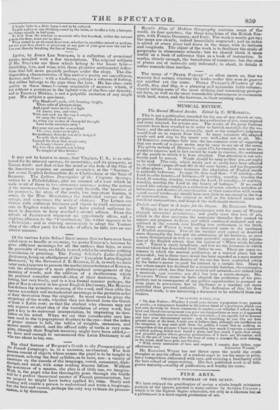MUSICAL REVIEW.
The Sacred Musical Amulet. Edited by C. 111‘KORKELL.
This is not a publication intended for tile use of any church or congregation, Established or otherwise, but a collection of airs, some original and some selected, for private use. The works of the great German masters have been resorted to in order to furnish materials for the volume; and the selection is, generally, such as the compiler's judgment would lead us to expect from him. Iii many instances the adapted words suit and sing to the music very well—but not in all. Mr. M`KoitEELL sometimes falls into the too common error of supposing that any words of a given metre may be sung to any air of the same. The pretty melody of HIMMEL'S, (page 17), for example, was never intended to express, and in fact cannot be made to express, the sentiment of the poetry to which it is here attached. Due attention is not uniformly paid to accent. Words should be sung as they are—or ought to be read. This rule, which might just as easily have been adhered to, is violated (pages 29 and 30) in the same hymn ; and too frequently in other places. In some instances the adaptation of English words is perfectly ludicrous. JO page 78, they read thus : " 0 worship—the Lord in—the beauty—of holiness-0 worship, worship, worship the Lord, 0 worship, worship, worship the Lord, 0 worship— 0 worship, worship, worship the Lord in the beauty of holiness." If we could regard this volume simply as a collection of notes, whether melodies or harmonies, and dismiss all consideration of their connexion with words —and sacred words—we should have very little to say except in the way of commendation. The original as well as the selected pieces are excellent compositions, and bespeak the well-taught musician.
Prelude and Fugue in A major for the Organ. By EGERTON 1VEBBC.
Willingly do we prolong our acquaintance with the name of WEBBC through successive generations ; and gladly trace that love of art, which in the first overcame the numerous obstacles that seemed to oppose any progress to fame, and which continued unabated and unsubdued in the second, now kindling into enthusiasm in the third. The name of WEIME is truly an honoured name hi the catalogue of English musicians. Few of the number ever earned or deserved more thoroughly the love and the admiration of his brethren, or gave a more disinterested as well as a more powerful support to the reputation of the English school, than the author of When winds breathe soft." Talent is rarely hereditary, and few are the instances in which musical talent has descended from father to son. There are tnany instances in which the musical profession, or a musical place; has so descended ; but in these cases music has been regarded as a mere matter of trade, and the future destiny of the son has been controlled solely by the father's power to push his interest in a certain line. Many a one whom nature has destined for a respectable butcher, cheesemonger, or attorney's clerk, has thus been twisted and tortured—not indeed into a musician, (qui nuseitur, non fit,) but into a music-monger. Mr. EGERTON WEBBE seems to have adopted the profession of his progenitors not in consequence of any golden opportunities in prospect or snug place in possession, but in obedience to a mandate yet more powerful than parental authority. The dedication of this, his first published work, is too interesting a document to be withheld from our readers.
" TO SAMUEL IV EBBE, F.,42.
" My dear Father—Whether I recall your former repugnance to my pursuit of music,—a repugnance founded in the justest dread of a profession which you had seen devoting its truest ornaments to neglect,—or whether I reflect on the kind and liberal encouragement you gave my compositions as soon as it appeared that my inclination was too strong to be overruled,—I am equally led to honour and love your disinterested nature : and, in inscribing to you this my first printed essay of the kind, I wish you to believe that, although not indifferent to the reception it may meet with from the public, I count that as nothing in comparison of the pleasure I have in recording how much I venerate a character in which nothing selfish ever found a place, and how much I prize that sweet and graceful genius whose genuine productions, if I have any divination, will live in the ear of time long after the buzz of many a summer-fly, now dancing in the wind, shall have gone out for ever. " With every sentiment of love and respect, I remain, dear father, your affectionate son, EGERTON WEE."
Mr. EGERTON WEirinE has not thrust upon the world the crude thoughts or puerile efforts of a student eager to see his name In print,
but a composition elaborated with care, and evincing a familiarity with the best school of organ-writing. His first published work is of fullgrown maturity—worthy of publication, and worthy his name.


























 Previous page
Previous page